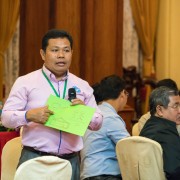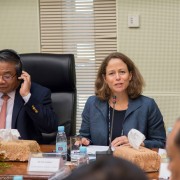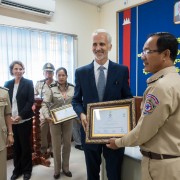Speeches Shim

The U.S. government in collaboration with UNICEF is committed to advancing Cambodia’s development, beginning with its children. We’ve taken a close look at this issue in Cambodia. The best way to tackle the problem, we believe, is to take an integrated approach to build strong beginnings, put family care first, and protect children. The early experiences of children have long-term impact on their bodies and brains. That’s why we support actions that underline the importance of body AND brain health, including nutrition and positive caregiving. They should also emphasize the importance of families to children's growth and development and education.

Over the past three years, we have increased our work specifically on nutrition with the support of the Feed the Future initiative. USAID is proud to partner with the Royal Government of Cambodia to tackle the problem of stunting. Working together, we’re focusing our efforts on the first 1,000 days of Cambodian children’s lives. We want our efforts to save lives, build resilience, increase economic productivity, and advance the country’s development. Our NOURISH project, led by Save the Children and the Rice Field Fisheries II project, led by WorldFish are two key initiatives supporting these efforts.

We consider human trafficking to be a global human rights challenge. It preys upon the vulnerable, breaks down rule of law, and corrupts global commerce. No challenge may be greater than the transnational crime of human trafficking which impacts millions of people worldwide each year including Cambodia.

We are here today to celebrate two things that Cambodia can count among its riches: beautiful art and abundant natural resources like its forests and rivers. Even in my short time in Cambodia, I’m truly impressed by the wealth of traditional art as well as the country’s natural beauty. These are very special gifts and it is up to all of us to make sure that they are nurtured and protected.
As much as 80 percent of Cambodia’s population relies on aquaculture and fisheries for their livelihoods. But rural communities’ dependence on Cambodia’s rich biodiversity is increasingly under threat from illegal logging, overfishing, a changing climate, poor financial services and inadequate production and storage infrastructure for crops.


Comment
Make a general inquiry or suggest an improvement.